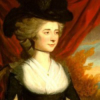Fanny Burney

Fanny Burney
Frances Burney, also known as Fanny Burney and after her marriage as Madame d'Arblay, was an English novelist, diarist and playwright. She was born in Lynn Regis, now King's Lynn, England, on 13 June 1752, to musical historian Dr. Charles Burneyand Esther Sleepe Burney. The third of six children, she was self-educated and began writing what she called her "scribblings" at the age of ten. In 1793, aged 41, she married a French exile, General Alexandre D'Arblay. Their only son,...
NationalityEnglish
ProfessionNovelist
Date of Birth13 June 1752
an old woman ... is a person who has no sense of decency; if once she takes to living, the devil himself can't get rid of her.
don't be angry with the gentleman for thinking, whatever be the cause, for I assure you he makes no common practice of offending in that way.
I'd rather be done any thing to than laughed at, for, to my mind, it's one or other the disagreeablest thing in the world.
the mind naturally accommodates itself, even to the most ridiculous improprieties, if they occur frequently.
... there's nothing but quarreling with the women; it's my belief they like it better than victuals and drink.
Imagination took the reins, and reason, slow-paced, though sure-footed, was unequal to a race with so eccentric and flighty a companion.
How little has situation to do with happiness.
There's no nation under the sun can beat the English for ill-politeness: for my part, I hate the very sight of them; and so I shall only just visit a person of quality or two of my particular acquaintance, and then I shall go back again to France.
Well of all things in the world, I don't suppose anything can be so dreadful as a public wedding--my stars!--I should never be able to support it!
The laws of custom make our [returning a visit] necessary. O how I hate this vile custom which obliges us to make slaves of ourselves! to sell the most precious property we boast, our time;--and to sacrifice it to every prattling impertinent who chooses to demand it!
Money is the source of the greatest vice, and that nation which is most rich, is most wicked.
When young people are too rigidly sequestered from [the world], their lively and romantic imaginations paint it to them as a paradise of which they have been beguiled; but when they are shown it properly, and in due time, they see it such as it really is, equally shared by pain and pleasure, hope and disappointment.
You have sensible women here [in England] but then, they are very devils--censorious, uncharitable, sarcastic--the women in Scotland have twice--thrice their freedom, with all their virtue--and are very conversable and agreeable--their educations are more finished.
Those who wander in the world avowedly and purposely in pursuit of happiness, who view every scene of present joy with an eye to what may succeed, certainly are more liable to disappointment, misfortune and unhappiness, than those who give up their fate to chance and take the goods and evils of fortune as they come, without making happiness their study, or misery their foresight.